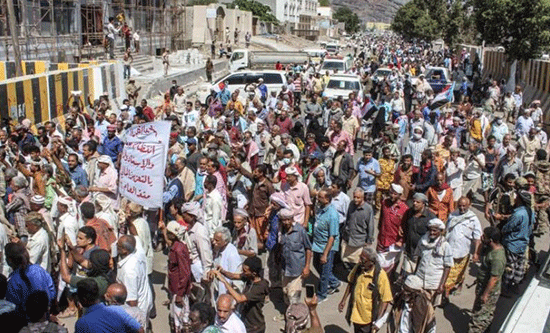
A new regime in Washington had instilled in some liberals the hope that the war on Yemen would end. But, despite the meek arms embargo imposed on Saudi Arabia over the excesses of its invasion and its butchery of journalist Jamal Khashoggi, the battle has intensified, and imperialist Britain has in any case picked up the tab for arming the Riyadh regime.
On 16 March, tens of thousands of Yemenis stormed and entered Maashiq Presidential Palace in Aden, as puppet government members including puppet Prime Minister Maeen Abdulmalik Saeed were evacuated under military escort to a faraway bunker. The uprising came amidst intensifying anger at mass hunger and economic chaos; Yemen has no functioning healthcare system – the UN warned that it had ‘effectively collapsed’ before the coronavirus epidemic – and has few working schools in a country where a quarter of civilian deaths are children. 66% of the Yemeni population now rely on food aid and 2.3 million under-five are projected to face acute malnutrition in 2021; the World Food Programme reports that 400,000 children are already suffering from severe acute malnutrition and are likely to die without urgent treatment.
According to Al Jazeera, protesters at the palace included members of the national security forces who have not been paid for nine months, and who effectively switched sides against the occupiers. Saudi Arabia props up the government recognised by the imperialist countries and their allies. While their stated aim is to stamp out the Houthi movement, which they see as an Iranian proxy, Saudi forces have long prioritised controlling Yemeni ports, and have focused on blockading Hodeidah port on the Red Sea. Meanwhile, its supposed ally United Arab Emirates controls Aden through its support for the separatist Southern Transitional Council (STC) movement. In June 2020 the STC staged a coup in Socotra Island’s capital of Hadiboh, driving out Saudi-backed government forces. Socotra is strategically located at the mouth of the Gulf of Aden. In February this year, UAE violated agreements with Saudi Arabia by transporting military equipment to Socotra in support of the STC.
Amidst this jockeying for position and brutal counterinsurgency, the Saudi blockade of Hodeidah port, the entry point of 70% of imports and conduit for humanitarian aid, has been a main cause of the crisis of hunger facing Yemen. Under pressure from the US Biden government, which has reversed the Trump-era terrorist designation of Houthi-led forces controlling much of north and central Yemen, the Saudi government has announced a ceasefire. At the time of writing, this has not amounted to anywhere near a full removal of its blockade of Hodeidah. In fact, such moves come at a time of rising popular discontent in Yemen and successful attacks on Saudi infrastructure by its Houthi opponents.
On 4 February, Biden announced an end to US support for Saudi-led offensive operations in Yemen, as part of what was labelled a broad reshaping of US foreign policy. In his first foreign policy speech as president, Biden continued the criticism of Gulf monarchies which had been a leitmotif of his election campaign: ‘This war has to end … And to underscore our commitment, we’re ending all American support for offensive operations in the war in Yemen, including relevant arm sales.’ At the same time, however, there would be no sanctioning of Saudi Crown Prince Mohammad Bin Salman over the murder of Khashoggi, as White House officials said a consensus developed that cooperation on ‘counterterrorism’ and in pushing back Iran were priorities. While the ‘freeze’ in arms sales was welcomed by Amnesty and others, Biden confirmed that the US would continue to provide ‘defensive support’ to Saudi Arabia from alleged Iranian attacks.
While the Washington government is asserting dominance over its Gulf allies, British authorised almost £1.4bn in weapons to Saudi in just four months after its July 2020 decision that there were now only ‘isolated incidents’ of civilian casualties. It was revealed in late February that, as the UN warned of a humanitarian catastrophe facing the Yemeni people and called for international donations, Britain had decided to cut its aid budget to Yemen by 50%. Around a quarter of the £4bn requested has been raised. The new Labour-backed Trident nuclear rearmament campaign will cost around £10bn. When foreign secretary Dominic Raab claimed to be leading a ‘problem-solving, conflict-resolving and conflict-management country,’ he is really saying that Britain will oppose any struggle which conflicts with British imperialism’s interests. Hands off Yemen!
Louis Brehony
FIGHT RACISM! FIGHT IMPERIALISM! 281 April /May 2021




